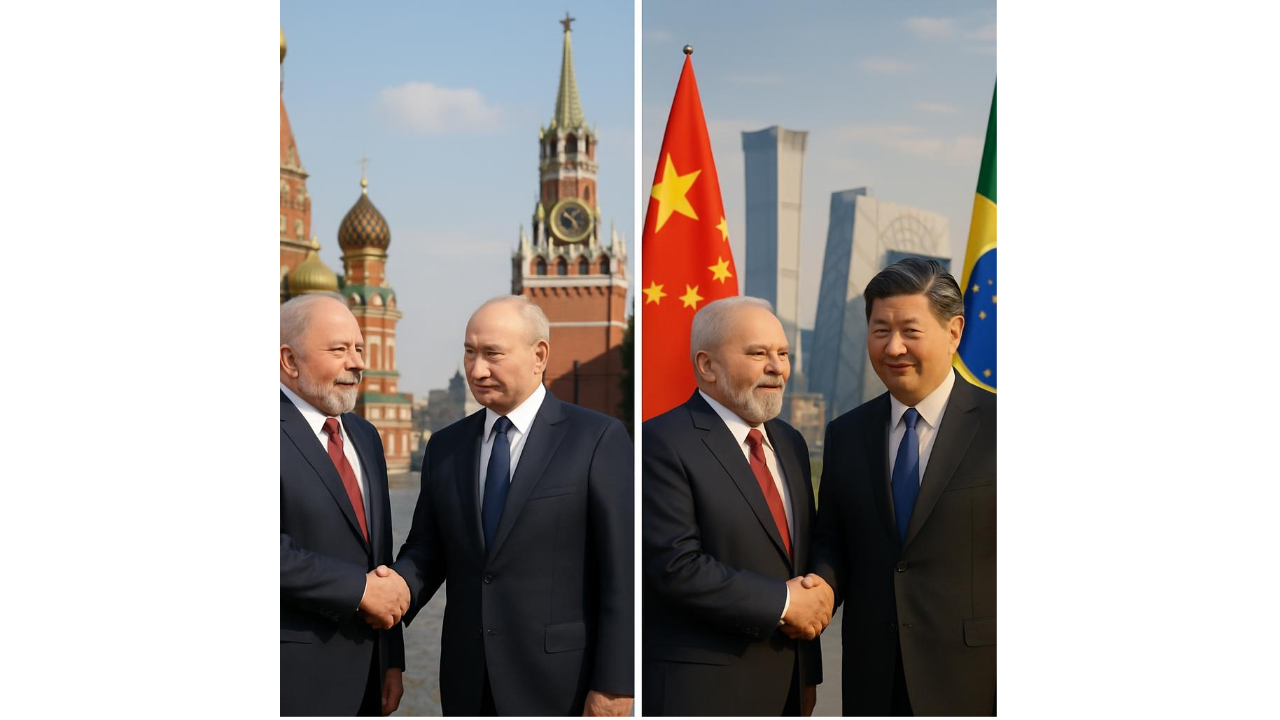President Luiz Inácio Lula da Silva’s diplomatic visits to Russia and China in May have sparked intense debate in Brazil, with major newspapers condemning his attendance at Moscow’s Victory Day parade while largely supporting the economic outcomes of his Beijing trip.
The Brazilian leader’s presence at Russia’s May 9 Victory Day celebrations drew particularly sharp criticism from the country’s leading media outlets, making him the only democratic leader among the dozens of heads of state who attended the military parade on Red Square.
Media Backlash Over Moscow Visit
Brazil’s three largest newspapers delivered scathing editorial commentary on Lula’s decision to stand alongside Vladimir Putin and Xi Jinping at the 80th anniversary commemoration of Soviet victory over Nazi Germany.
Folha de São Paulo, the country’s most influential daily, described Lula’s Moscow appearance as “not pragmatism, only a diplomatic error,” arguing that by consorting with autocrats, the president was attending “the glorification of another actual conflict condemned by the majority of the democracies of the world, with the exception of Brazil.”
O Globo of Rio de Janeiro was even more direct, running an editorial titled “Lula in Moscow: The wrong side of history.”
The criticism reflects broader concerns about Brazil’s neutral stance on the Ukraine war. Since Russia’s 2022 invasion, Lula’s government has abstained from votes to suspend Russia from UN human rights bodies and refused to supply weapons to Ukraine, frustrating Kyiv to the point where Ukraine withdrew its ambassador from Brasília.³
Economic Pragmatism Drives Policy
The Lula administration has defended the visits as essential to Brazil’s economic interests and regional leadership. Russia has become a crucial energy supplier, now providing 65% of Brazil’s diesel imports—up from less than 1% in 2021. Brazil paid Russia nearly $10 billion for diesel in 2024, while Russian fertilizers remain vital for the country’s powerful agribusiness sector.
“Brazil has political, commercial, cultural, scientific, and technological interests with Russia,” Lula told reporters before departing for China. “We believe that, at this historic moment, we can significantly deepen our trade ties.”
Trade between Brazil and Russia reached $12.4 billion in 2024, though the balance heavily favors Russia, leaving Brazil with a $9.5 billion deficit.
China Visit Yields Economic Gains
While the Moscow visit drew criticism, Lula’s subsequent trip to Beijing received more positive domestic coverage, particularly regarding its economic outcomes.
At a business forum in Beijing, Lula celebrated more than $4.5 billion in upcoming Chinese investments across Brazilian sectors ranging from automaking and renewable energy to pharmaceuticals and semiconductors.
“If it’s up to my government, our relationship with China will be indestructible,” Lula told business leaders in Beijing.
Brazil’s trade promotion agency reported attracting approximately 27 billion reais ($4.8 billion) in Chinese investments during the visit. Major deals included a $1 billion investment by China’s Envision Group in Brazilian production of sustainable aviation fuel from sugarcane.
Strategic Nonalignment Policy
Foreign policy experts describe Lula’s approach as “active nonalignment,” reflecting Brazil’s attempt to navigate an increasingly multipolar world while maintaining autonomy from Western pressure.
“The natural path is to look for alternatives. China is one of them,” said a Brazilian diplomat, speaking anonymously about the country’s response to U.S. President Donald Trump’s unpredictable trade policies.
China has been Brazil’s largest trading partner since 2009, accounting for 28% of Brazilian exports and 24.2% of imports in 2024. By contrast, the United States ranked second, providing 12% of Brazil’s imports and purchasing 15.5% of its exports.
Opposition and International Concerns
Critics argue there is an inherent contradiction between Brazil’s longstanding foreign policy of upholding national sovereignty and territorial integrity and its acquiescence to Russia’s actions in Ukraine.⁹
International observers have also questioned Brazil’s positioning. In a recent analysis, one critic described Lula’s Russia visit as “hypocritical, undermining everything he allegedly stands for,” noting that Putin has implemented in Russia many of the authoritarian practices Lula historically opposed in Brazil.
Looking Ahead
The visits underscore Brazil’s determination to maintain what Lula calls an independent foreign policy, prioritizing economic relationships over Western calls for diplomatic isolation of Russia.
Brazil will host the BRICS summit in Rio de Janeiro in July, where Lula will again meet with both Putin and Xi Jinping, further cementing these controversial but economically important relationships.
The challenge for Lula will be balancing Brazil’s economic pragmatism with growing domestic and international pressure over his government’s stance on global democratic norms and the Ukraine conflict.
The featured image was produced by an AI program.
See also the following:
Lula in Moscow and Beijing: Coming to Terms with the Multi-Polar Authoritarian World?


